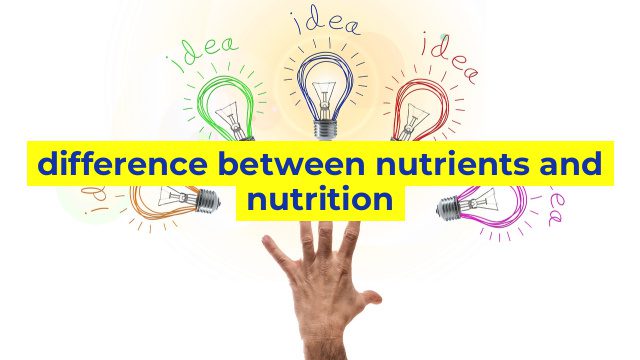The Difference Between Nutrients and Nutrition Explained
When it comes to health and wellness, there are many terms thrown around that can be confusing. Two such terms are “nutrients” and “nutrition.” While they may seem similar, there is a significant difference between the two. In this article, we will explain the distinction between nutrients and nutrition so that you can understand how they affect your overall health.
What Are Nutrients?
Nutrients are the vital components of food that the body requires to function correctly. There are six essential nutrients that we need to function properly: carbohydrates, proteins, fats, vitamins, minerals, and water. Each of these nutrients has a specific purpose in the body, and a deficiency in any of them can lead to health problems.
Carbohydrates, for example, are essential for providing energy to the body, while proteins are necessary for building muscle tissue. Fats are crucial for energy storage and the absorption of some vitamins. Vitamins and minerals are essential for several functions, including bone health, immune function, and hormone regulation. Water is necessary for bodily functions, including digestion and waste removal.
Each nutrient has its own set of specific functions in the body, and a lack of any one of them can lead to health problems. For this reason, it’s essential to eat a balanced diet that includes all of the essential nutrients.
What Is Nutrition?
Nutrition, on the other hand, encompasses all aspects of how food affects the body. It includes the way that we digest and absorb nutrients, how the body uses those nutrients, and how food affects our overall health.
Good nutrition involves eating a balanced diet that is rich in nutrients and limits processed and unhealthy foods. Adequate nutrition is essential for overall health, energy, and fitness. The benefits of good nutrition are numerous, including maintaining a healthy weight, preventing chronic diseases, and improving cognitive function.
It’s essential to remember that nutrition is more than just eating a diet filled with the right nutrients. Other factors, such as stress, exercise, and sleep, also play a significant role in overall health and well-being.
The Bottom Line
In summary, while the terms “nutrients” and “nutrition” may seem interchangeable, there is a significant difference between the two. Nutrients are the essential components of food that the body requires to function properly, while nutrition encompasses how food affects the body in terms of digestion, absorption, and overall health.
Eating a balanced diet with all the essential nutrients is the foundation of good nutrition. However, many other lifestyle factors also play a role in overall health and wellness. By paying attention to both nutrients and nutrition, we can achieve optimal health and well-being.
Table difference between nutrients and nutrition
| Nutrients | Nutrition |
|---|---|
| Nutrients are specific chemical compounds found in food that are essential for the body’s growth, maintenance, and repair. | Nutrition refers to the process by which the body obtains and uses nutrients from food. |
| Nutrients can be classified into six main categories: carbohydrates, proteins, fats, vitamins, minerals, and water. | Nutrition includes the study of how food is consumed, digested, and metabolized, as well as the effects of food on health and disease. |
| Nutrients are measured in units such as grams, milligrams or micrograms. | Nutrition can be assessed by evaluating a person’s dietary habits, body weight and composition, and other health indicators. |
| If a person is deficient in one or more nutrients, they may experience a range of health problems. | If a person does not consume an adequate amount of all essential nutrients, they may suffer from malnutrition. |
| Examples of nutrient-rich foods include leafy greens, whole grains, lean proteins, and nuts and seeds. | Good nutrition involves consuming a variety of foods from different food groups, such as fruits and vegetables, whole grains, lean proteins, and low-fat dairy, in the right amounts to maintain health. |

